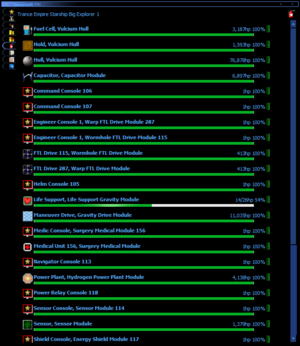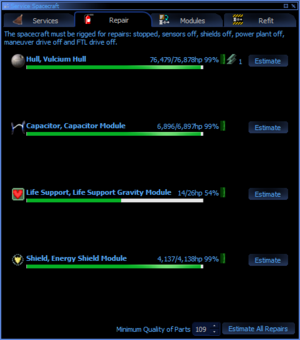Spacecraft Damage Control: Difference between revisions
m (→Manual Repair) Tag: Reverted |
|||
| Line 59: | Line 59: | ||
===Cannibalizing for Parts=== | ===Cannibalizing for Parts=== | ||
Parts can be removed from a subsystem in the same way. Select a tool. Look at a system's [[ | Parts can be removed from a subsystem in the same way. Select a tool. Look at a system's [[Design_Parts#Panel,_Capacitor|service panel]]. Use the item's alternate action to remove a part, rather than install one. The default key binding for this is <code>Shift + G</code>. A part is removed if there is space in your inventory to hold the part; otherwise no part is removed. | ||
===Specific Subsystems=== | ===Specific Subsystems=== | ||
| Line 68: | Line 68: | ||
Manual repairs to a [[Space_Vehicle_Launcher|space vehicle launcher]] are performed at the launch pad, which is the large icon placed in the blueprint at the beginning of the launch tube. | Manual repairs to a [[Space_Vehicle_Launcher|space vehicle launcher]] are performed at the launch pad, which is the large icon placed in the blueprint at the beginning of the launch tube. | ||
Manual repairs to a [[Space_Vehicle_Recovery_System|space vehicle recovery system]] are performed at [[ | Manual repairs to a [[Space_Vehicle_Recovery_System|space vehicle recovery system]] are performed at [[Design_Parts#Parking_Spot,_Space_Vehicle|space vehicle parking spot]]s. | ||
===Tool List=== | ===Tool List=== | ||
Revision as of 13:29, 14 March 2024
| This section is in need of revision. Please help improve it or discuss these issues on the talk page. The reason given is: Page is only about half done. I wrote all this on my phone, so expect typos. The use of the Category:Spacecraft also need thought. |
| This section is in need of revision. Please help improve it or discuss these issues on the talk page. The reason given is: Need updating to match new update. See: 2020-01-10 Spacecraft Damage and Modules, Organ Models |
When a spacecraft is damaged, either in combat or by the environment, it will require repairs to bring it back to top performance.
Types of Damage

A spacecraft is composed of multiple subsystems, all of which can be damaged independently of one another. These subsystems are:
- Control Stations (each control station separate)
- FTL Drives (up to two separate)
- Life Support
- Maneuver Drive
- Power Plant
- Sensor
- Shield
- Weapon Systems (each bay separate)
- Fuel Cell
- Hold
- Hull
- Vehicle Bay
Damaged Subsystems
Most spacecraft subsystems gains a penalty or even stop functioning when damaged.
Subsystems such as maneuver drive, power plant, sensor, weapon system, and shield all incur percentage based functionality reduction depending on the damage.
A damaged FTL drive will leave it inoperable. A bigger FTL drive than necessary will allow for some buffer before it is inoperable.
When the hold or fuel cell is damaged, there is a chance that cargo may be destroyed or fuel may leak out. If the hold or fuel cell is not already at 0% health when it is hit, there is a 1% chance that cargo or fuel will be lost. If the hold or fuel cell is already at 0% health when it is hit, cargo or fuel will be lost every time. Fuel leaks at the rate of 1 unit of fuel per 5 units of damage. Cargo is destroyed at the rate of 1 unit of cargo per 5 units of damage.
When the vehicle bay is damaged, there is a chance that a vehicle may be destroyed. If the vehicle bay is not already at 0% health when it is hit, there is a 1% chance that a vehicle will be destroyed. If the vehicle bay is already at 0% health when it is hit, a vehicle will be destroyed every time. One vehicle is destroyed, regardless of the amount of damage inflicted. Vehicles may be located anywhere aboard the ship; they do not have to reside in a vehicle bay to be destroyed in this way. Occupied vehicles are not destroyed.
Destroyed Subsystems
A few specific spacecraft subsystems are critical, if they are destroyed the whole spacecraft will fail. But generally the destroyed subsystem just becomes inoperable until repaired.
Critical systems are:
These subsystems cannot be reduced below 0 hit points in a single strike. When a strike exceeds the remaining hit points, their hit points are reduced to 0.
When a critical subsystem is already at 0 hit points, it is vulnerable to catastrophic failure. A hit on a critical subsystem that is already at 0 hit points causes critical failure of the subsystem and destruction of the spacecraft.
Spacecraft Repair
There are two ways to repair a spacecraft, either manually repairing each subsystem or purchasing repairs from an airport repair shop.
Manual Repair
It is possibly to manually repair a spacecraft's subsystems using the commodities and the associated tool listed on the "Spacecraft Damage Report".
Repairing
To repair a damaged subsystem, select the appropriate tool as your selected use item. The tool shows the part that it repairs next to the tool icon on the screen. Look at the damaged subsystem's service panel. The targeted subsystem is indicated by an icon next to the health bar of the ship that appears at the top of the screen. A number next to the part icon by the tool shows the quantity of parts needed by the targeted subsystem. Click with the mouse to install parts. Parts are taken from the hold of the ship if available; a part is taken from your inventory otherwise.
Tools repair 1 to 6 parts each use. The formula is:
parts = log2(tech level) + 1
Multiple part repair only happens when the parts are drawn from the hold.
Cannibalizing for Parts
Parts can be removed from a subsystem in the same way. Select a tool. Look at a system's service panel. Use the item's alternate action to remove a part, rather than install one. The default key binding for this is Shift + G. A part is removed if there is space in your inventory to hold the part; otherwise no part is removed.
Specific Subsystems
Hull, hold and fuel cell are all considered to be parts of the same "Hull" system. Manual repairs to the hull subsystem are applied to the hull portion until it is fixed, then repairs are applied to the fuel cell, and finally to the hold.
When you are standing in a room with access to the fuel coupling, manual repairs are applied to the fuel cell first. When you are standing in a room with cargo hold access, manual repairs are applied ot the hold first.
Manual repairs to a space vehicle launcher are performed at the launch pad, which is the large icon placed in the blueprint at the beginning of the launch tube.
Manual repairs to a space vehicle recovery system are performed at space vehicle parking spots.
Tool List
Purchase Repair

In order to repair a spacecraft, it must be landed on a building site of a building connected to an airport repair shop or moored to a space station in a solar system with a city that has one. Then all its subsystems must be turned off. This can be done by "Rig for Repair or Refit. Officer Get Repairs." order.
The crew responds by turning off the subsystems they are operating and preparing the ship for repairs. They do not actually perform the repairs; the crew just configure the spacecraft to be ready for repairs.

Repairs can then be purchased using the Spacecraft Services button on the Trade communication channel, all cities in range with an airport repair shop will reply with an offer of repairing the spacecraft. Accept the repair offer that that is best suited, if anything is miss.
If an officer has the con, the officer will purchase the repairs once the subsystems are turned off. If the spacecraft does not need repairs when the repair order becomes current, the officer immediately skips to the next order so the crew does not rig the spacecraft for repairs.